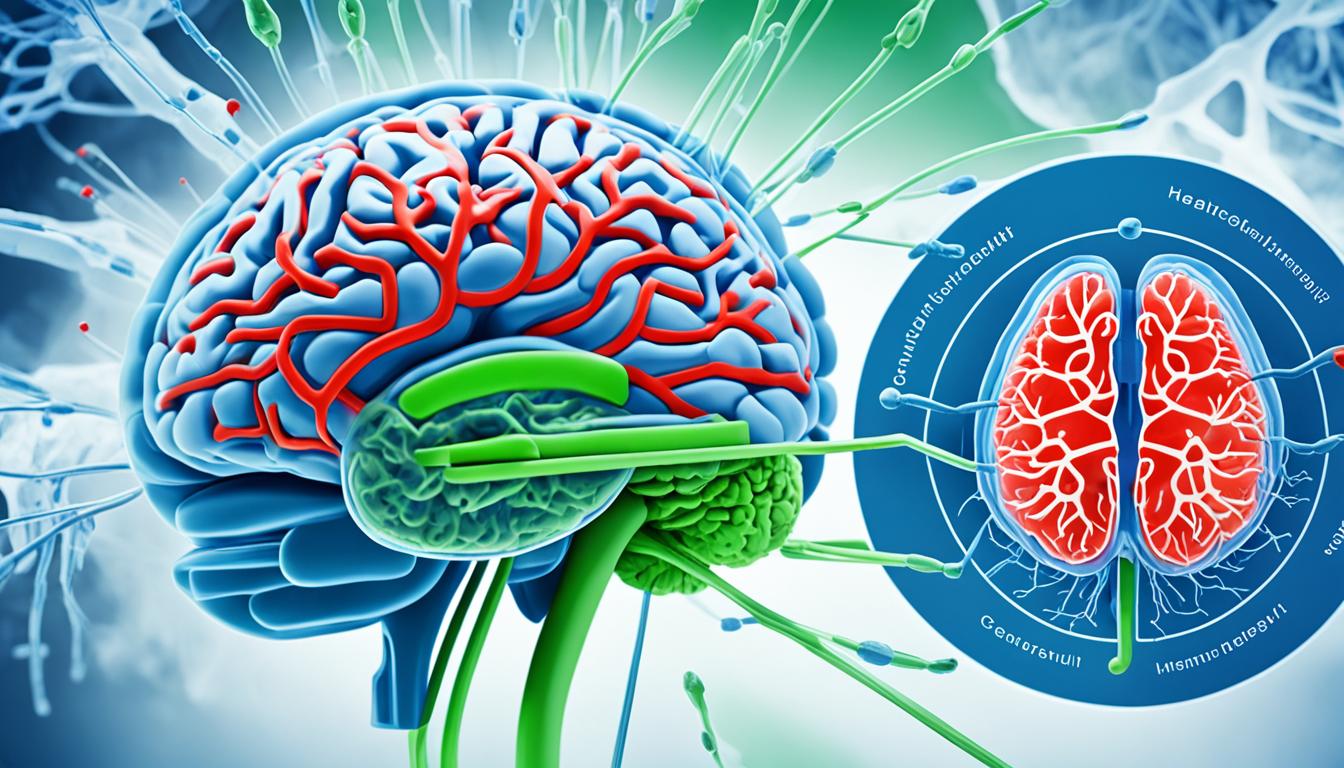Sclerosis multiple, or multiple sclerosis (MS), is an autoimmune disease. It affects the central nervous system. This disease damages the protective cover around nerves, known as myelin.
MS can cause muscle weakness, vision changes, numbness, and memory problems. There is no cure for MS yet, but treatments can help manage symptoms and slow down the disease. The exact causes of MS are not fully known, though genes and the environment may play a role.
To diagnose MS, doctors use clinical exams, your medical story, and imaging tests. Recently, stem cell therapy has become a possible treatment for MS. It’s especially hopeful for people with relapsing-remitting MS who don’t get better with other drugs.
Key Takeaways:
- Sclerosis multiple, or multiple sclerosis (MS), is an autoimmune disease affecting the central nervous system.
- MS can cause various symptoms, including muscle weakness, vision changes, numbness, and memory issues.
- Treatment options exist to manage MS symptoms and slow disease progression, but there is no cure currently available.
- The causes of MS are believed to involve a combination of genetic and environmental factors.
- Diagnosis of MS typically requires a thorough evaluation, including a medical history review and imaging tests.
- Stem cell therapy has shown promise as a potential treatment for MS, especially for individuals with relapsing-remitting MS who have not responded to other medications.
Symptoms and Diagnosis of Multiple Sclerosis
Multiple sclerosis (MS) is a complex disease with a wide variety of symptoms. These symptoms differ from one person to another. This variation makes diagnosing and treating MS very challenging. Knowing about the symptoms and diagnosis process can help people with MS.
Common Symptoms of MS
MS affects various parts of the body, showing symptoms like:
- Muscle weakness
- Tingling or numbness in the limbs
- Trouble speaking
- Chronic pain
- Depression
- Vision loss
These symptoms might show up suddenly or get worse over time. They can greatly affect everyday life. Early symptom recognition and prompt treatment are key to managing MS effectively.
Diagnosing Multiple Sclerosis
Getting an MS diagnosis involves a complete health evaluation. The diagnosis process includes:
- Review of Symptoms: A detailed look at the symptoms and their history is crucial to considering MS.
- Medical History: Doctors review your medical past to find out any risks for MS.
- Neurological Examination: They check your reflexes, coordination, and feeling, which gives clues about your central nervous system.
- Imaging Tests: Tests like MRI search for specific damages in the central nervous system. Finding these damages helps confirm MS.
MS diagnosis needs a mix of careful evaluation, history, and tests. An accurate diagnosis is vital. It guides the right treatment and management plans for MS.
Knowing about MS symptoms and how it’s diagnosed helps people become active in their care. They can collaborate with their healthcare team to make life better.
Causes and Risk Factors of Multiple Sclerosis
The exact causes of MS are still a mystery. But, we know both genes and the environment are involved. Certain genes make you more likely to get MS but don’t mean you will get it. Also, where and how you live can up your risk.
Viral infections, especially Epstein-Barr, can make you more likely to get MS. Smoking is also bad news; it can up your chances and make symptoms worse. Low vitamin D and eating too many saturated fats up your risk too.
Not getting enough vitamin D can make you more likely to develop MS. Vitamin D is key for a strong immune system. Eating a healthy diet, rich in fruits and vegetables, can lower your MS risk.
Living with MS is tough due to its ups and downs. Symptoms vary a lot from person to person, making it hard to treat. But, knowing more about MS can help you take better care of yourself and make smart choices.
Despite the hurdles, there’s light at the end of the tunnel. Medicine and treatments for MS keep getting better. Stay informed, eat right, and get support. This way, you can still live a happy, active life.
| Genetic Factors | Environmental Factors |
|---|---|
| Certain genetic variations increase the risk of developing MS. | Viral infections, especially Epstein-Barr virus |
| Smoking | |
| Low vitamin D levels | |
| Diet high in saturated fats |
Stem Cell Therapy for Multiple Sclerosis
Stem cell therapy offers hope for those with relapsing-remitting MS (RRMS) who haven’t found relief with other drugs. It focuses on hematopoietic stem cell transplantation (HSCT), which is a type of stem cell transplant.
In HSCT, stem cells are first collected and saved from the person’s own blood. They then go through intense chemotherapy and their immune system is suppressed. This reset is aimed at stopping the disease’s advance and boosting myelin regrowth.
Several clinical trials and research have shown HSCT’s benefits, like fewer relapses and brain lesions. Yet, it’s still an experimental treatment for MS. So, more studies are crucial to grasp how well it works and its safety.

